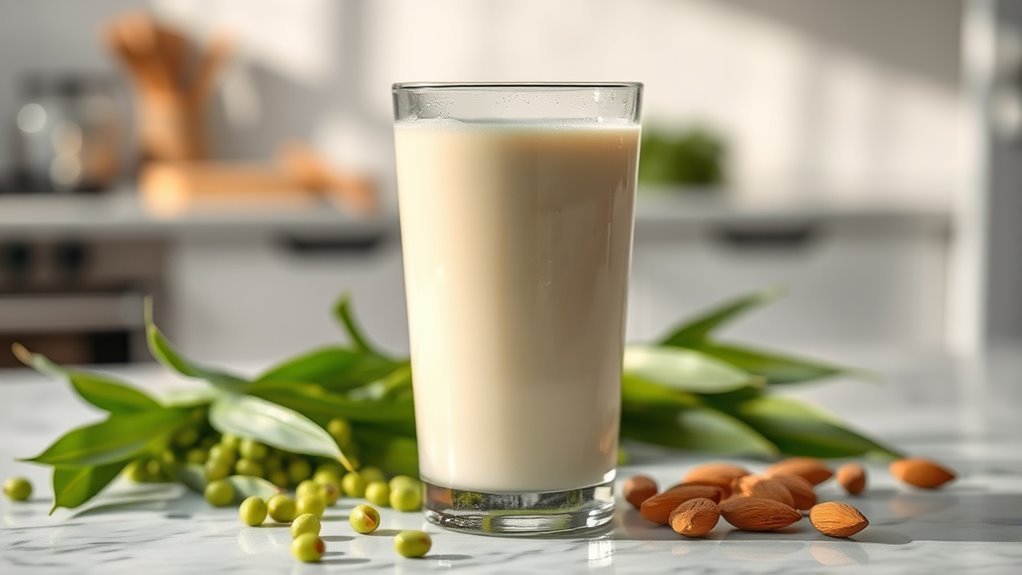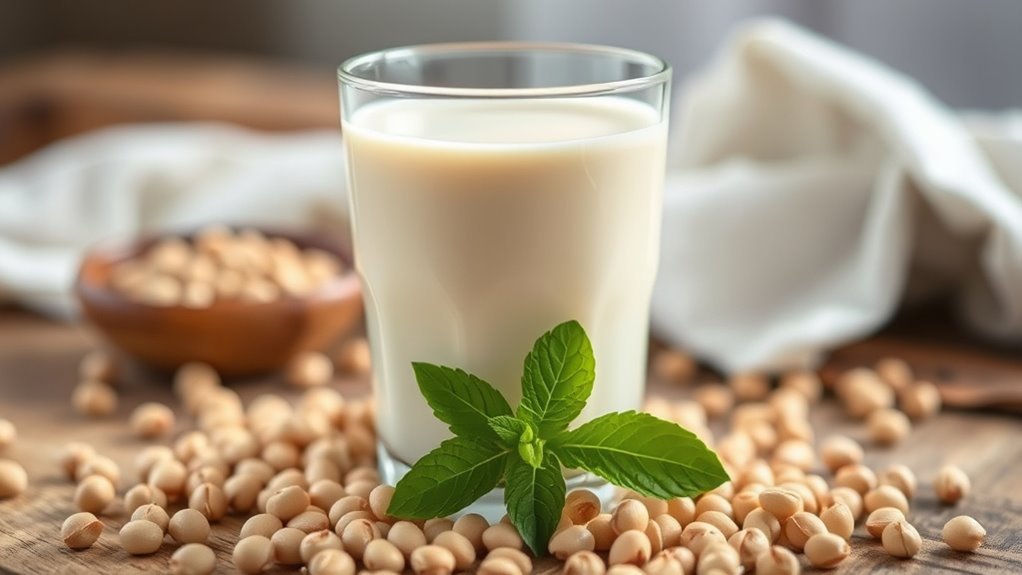Yes, soy milk can be keto-friendly when consumed in moderation. Unsweetened soy milk has about 1-2 grams of net carbs per cup, along with a good amount of protein and healthy fats. This makes it a suitable choice for maintaining ketosis while providing essential nutrients. However, be cautious of brands with added sugars, as they can raise the carb count. If you want to know more about incorporating soy milk into your keto diet, there’s plenty to explore.
Understanding the Ketogenic Diet

Understanding the ketogenic diet is essential if you’re considering its potential benefits for weight loss and overall health. The ketogenic principles revolve around drastically reducing carbohydrate intake while increasing healthy fats, which helps shift your body into ketosis—a state where it burns fat for fuel. This approach can lead to effective weight loss and improved energy levels. However, it comes with dietary restrictions that can be challenging. You’ll need to avoid high-carb foods like grains, sugar, and certain fruits. Instead, focus on low-carb vegetables, nuts, and quality proteins. Embracing these principles allows you to experience the freedom of a sustainable lifestyle change while reaping the benefits of ketosis, as long as you stay committed to your dietary choices. Additionally, understanding the role of carbohydrates in the diet is crucial for making informed food choices.
What Is Soy Milk?

Soy milk, a popular plant-based alternative to dairy, is made by soaking and grinding soybeans, then boiling the mixture and filtering out solids. It offers several soy milk benefits, including being low in saturated fat and providing a good source of protein. Many people turn to soy milk for its creamy texture and versatility in recipes, making it an excellent choice for smoothies, coffee, and baking. If you’re looking for soy milk alternatives, options like almond milk, oat milk, and coconut milk are available, each with its unique taste and nutritional profile. By incorporating these alternatives, you can enjoy diversity in your diet while catering to specific dietary needs or preferences.
Nutritional Profile of Soy Milk

When evaluating soy milk’s nutritional profile, you’ll find that its carbohydrate content is relatively low, making it a potential option for those on a keto diet. Additionally, soy milk offers a balanced amount of protein and healthy fats, which can help support your dietary needs. Understanding these components is essential for determining how soy milk fits into your overall nutrition plan.
Carbohydrate Content Analysis
While exploring options for a keto-friendly diet, it’s important to examine the carbohydrate content of soy milk. Typically, unsweetened soy milk contains about 1-2 grams of carbs per cup, making it a viable choice for those on a ketogenic diet. Here are a few key points to take into account:
- Low Carbohydrate Count: Ideal for maintaining ketosis, especially in unsweetened varieties.
- Fiber Content: Soy milk offers some fiber, which can help with digestion and satiety.
- Soy Milk Benefits: It’s also a great source of protein and essential nutrients compared to many soy milk alternatives. Additionally, soybeans are low in carbs and high in protein, enhancing their suitability for keto diets.
Protein and Fat Balance
One cup of unsweetened soy milk typically contains around 7 grams of protein and 4 grams of fat, making it a balanced option for those on a ketogenic diet. This nutritional profile provides a decent protein source while also supplying healthy fat sources, which are essential for maintaining ketosis. The protein in soy milk is plant-based, offering a complete amino acid profile, which is great for muscle health. Additionally, the fat content contributes to satiety, helping you feel full longer. When considering your dietary choices, incorporating soy milk can be a strategic way to achieve the right protein and fat balance without exceeding your carb limits. So, if you’re looking for alternatives to dairy, soy milk’s nutritional profile is worth considering. Moreover, unlike some milk alternatives, soy milk is low in carbs, making it suitable for keto diets.
Carbohydrate Content in Soy Milk
When considering soy milk on a keto diet, you’ll want to pay close attention to its carbohydrate content. Typically, unsweetened soy milk contains around 1-2 grams of net carbs per cup, making it a lower-carb option compared to many other milk alternatives. Understanding how these numbers stack up against other milks can help you make an informed choice that aligns with your dietary goals.
Carbs in Soy Milk
Soy milk typically contains about 3 to 4 grams of carbohydrates per 1-cup serving, making it a relatively low-carb option compared to many other milk alternatives. If you’re considering soy milk for its potential benefits, you’ll find it can fit into a keto diet, given its lower carb count. Here are a few things to keep in mind:
- Nutrient Density: Packed with proteins and essential vitamins, soy milk offers more than just calories.
- Heart Health: Rich in isoflavones, it may support cardiovascular health.
- Versatile Use: Perfect for smoothies, coffee, and cooking without adding excessive carbs.
These soy milk benefits make it a strong contender for those seeking keto diet compatibility while enjoying a dairy-free lifestyle. Additionally, it’s important to be aware of carbohydrate content when incorporating soy milk into your daily intake to maintain ketosis.
Net Carbs Calculation
Although soy milk is a low-carb alternative, understanding its net carbohydrate content is essential for anyone on a keto diet. Net carbs are calculated by subtracting fiber from total carbohydrates, as fiber doesn’t impact blood sugar levels. A typical unsweetened soy milk contains around 1-2 grams of net carbs per cup, making it a suitable option for keto followers. This is considerably lower than many other soy alternatives, such as sweetened soy milk or flavored varieties. If you’re watching your carb intake, always check labels for added sugars or other ingredients that can increase net carbs. By being mindful of your choices, you can enjoy soy milk while sticking to your keto lifestyle. Additionally, the carbohydrate content in soy milk allows for balanced meal options when combined with other low-carb foods.
Comparison With Other Milks
While considering milk alternatives on a keto diet, it’s crucial to compare their carbohydrate content. Soy milk stands out among other options, but here’s how it stacks up nutritionally:
- Almond Milk: Typically contains about 1-2 grams of carbs per cup.
- Coconut Milk: Usually has around 2 grams of carbs per cup, depending on the brand.
- Regular Cow’s Milk: Contains roughly 12 grams of carbs per cup.
When you look at these nutritional comparisons, soy milk generally has about 4 grams of carbs per cup. This makes it a reasonable choice among milk alternatives for those seeking to maintain a keto lifestyle. Additionally, unsweetened varieties of soy milk are key to avoiding added sugars that can disrupt ketosis. Always check labels to guarantee you’re aware of added sugars and make informed choices that align with your dietary goals.
Impact of Soy Milk on Ketosis
How does soy milk fit into a ketogenic diet? If you’re looking for a creamy, plant-based option, soy milk can be a suitable choice. It’s relatively low in carbohydrates, typically containing around 1-2 grams per serving, which can help you maintain your ketosis effects. However, you should always check the label for added sugars, as some brands may have higher carb counts. The protein content in soy milk is also beneficial, providing a good source of nutrients that can support your overall health on a keto diet. Just keep in mind that moderation is key. While soy milk can be included, balancing it with other low-carb foods will help you stay in ketosis and enjoy your dietary freedom.
Comparing Soy Milk to Other Non-Dairy Milks
When considering non-dairy milk options on a ketogenic diet, soy milk stands out among its counterparts like almond, coconut, and oat milk due to its nutritional profile. Here’s how they compare:
- Protein Content: Soy milk typically contains about 7 grams of protein per cup, while almond milk has only 1 gram, making soy a better choice for muscle maintenance.
- Carbohydrate Levels: Almond milk usually contains fewer carbs than soy milk, making it more keto-friendly for some.
- Fat Content: Coconut milk is higher in saturated fats, but soy milk offers a good balance of healthy fats.
In these nutritional comparisons, soy milk provides a unique blend of protein and moderate carbs, giving you freedom in your dietary choices. Additionally, it’s important to consider the impact of lactose metabolism on your daily carb intake to ensure you stay within your keto limits.
Health Benefits of Soy Milk
Soy milk offers several health benefits that might catch your interest. It’s high in protein while being low in calories, making it a great option for those looking to maintain muscle mass without excess calories. Additionally, research suggests that soy milk may support heart health by helping to lower cholesterol levels.
High Protein Content
Although many plant-based milk alternatives are low in protein, soy milk stands out due to its impressive protein content. This high protein profile makes it a fantastic option for those focused on muscle recovery and overall health. When you choose soy milk, you’re not just getting a delicious drink; you’re also fueling your body with essential nutrients.
Here are three key benefits of soy milk’s high protein content:
- Muscle Repair: Supports recovery after workouts, helping you bounce back faster.
- Satiety: Keeps you feeling full longer, reducing cravings throughout the day.
- Nutritional Boost: Provides essential amino acids, vital for overall wellness. Additionally, soy milk is typically low in carbohydrates, making it a suitable option for those following keto diets.
Incorporating soy milk into your diet can empower your health journey.
Low in Calories
In addition to its high protein content, soy milk is also low in calories, making it an appealing choice for those on a keto diet. With around 80 calories per cup, it offers significant low calorie benefits compared to many dairy and non-dairy milk options. This allows you to enjoy a creamy, nutritious beverage without compromising your daily calorie limits. Additionally, soy milk alternatives often contain added sugars, which can push you out of ketosis. By choosing unsweetened soy milk, you can maintain your dietary goals while still satisfying your taste buds. Incorporating low-calorie options like soy milk can help you feel full and energized, giving you the freedom to explore diverse recipes without guilt.
Heart Health Benefits
When considering your heart health, incorporating soy milk into your diet can be a smart choice. Research indicates that soy milk can positively impact cholesterol levels, potentially reducing the risk of heart disease. Here are three key benefits:
- Plant-Based Proteins: Soy milk contains high-quality proteins that support heart function.
- Isoflavones: These compounds may help lower LDL (bad) cholesterol, improving overall heart health.
- Low Saturated Fat: Unlike dairy milk, soy milk has minimal saturated fat, which is beneficial for maintaining healthy cholesterol levels. Additionally, soy milk is low in carbs, making it a suitable option for various dietary plans.
Potential Drawbacks of Soy Milk on Keto
While soy milk can be a popular dairy alternative, it has some potential drawbacks for those following a ketogenic diet. One concern is soy milk allergies, which can cause reactions in some individuals, leading to discomfort or more severe health issues. Additionally, soy contains phytoestrogens, which may impact hormone levels. For those sensitive to hormonal fluctuations, this could be a significant factor to take into account. Furthermore, many commercial soy milk brands contain added sugars and carbohydrates, potentially conflicting with your keto goals. If you’re committed to maintaining a strict ketogenic lifestyle, it’s crucial to read labels carefully and evaluate how soy milk fits into your overall diet. Balancing these factors will help you make informed choices.
How to Incorporate Soy Milk Into a Keto Diet
To successfully incorporate soy milk into a keto diet, it’s essential to choose unsweetened varieties to avoid excess carbohydrates that could hinder your progress. Here are a few ideas to get you started:
Incorporating unsweetened soy milk into your keto diet can help keep carbs in check while adding creaminess to your meals.
- Keto Smoothies: Blend unsweetened soy milk with spinach, avocado, and a few berries for a creamy, low-carb treat.
- Soy Milk Recipes: Use unsweetened soy milk in savory dishes, like soups or sauces, to add creaminess without compromising your carb count.
- Coffee Alternative: Swap traditional creamers for unsweetened soy milk in your coffee or tea, giving your beverages a smooth texture without the added sugars.
Alternative Milk Options for a Keto Lifestyle
As you explore alternative milk options for a keto lifestyle, it’s important to focus on those that align with your low-carb goals. Nut milk, such as almond and macadamia, are excellent keto alternatives due to their low carbohydrate content and healthy fats. Unsweetened versions typically contain 1-2 grams of carbs per cup, making them suitable for your diet. Coconut milk, particularly the full-fat variety, is another fantastic option, boasting rich flavor and creaminess. Hemp milk is also worth considering, as it’s low in carbs and high in omega-3 fatty acids. When choosing your nut milk or alternative, always opt for unsweetened varieties to avoid unnecessary sugars. These options empower you to enjoy your favorite beverages while staying true to your keto lifestyle.
Frequently Asked Questions
Can I Use Soy Milk in Keto Smoothies?
Absolutely, you can use soy milk in your keto smoothies! It’s like adding a silky blanket of creaminess, while packing in nutritional benefits like protein and low carbs. Just make sure to choose unsweetened varieties to keep your macros in check. Blend it with leafy greens, avocado, or berries, and you’ve got a deliciously nutritious concoction. Experiment with different smoothie recipes, and enjoy the freedom of tasty, keto-friendly options!
Does Soy Milk Affect Weight Loss on Keto?
Soy milk can affect your weight loss on keto, but it depends on your overall diet and how much you consume. It’s lower in carbs than regular milk, which might help you stay within your daily limits. However, it contains some calories and carbs that could add up. If you enjoy it in moderation and balance it with your other food choices, you can still achieve your weight loss goals effectively.
Is Organic Soy Milk Better for Keto?
When it comes to choosing between organic and regular soy milk, you might feel like you’re splitting hairs. Organic soy milk generally offers more nutritional benefits, as it’s made from non-GMO soybeans and often has fewer additives. While it can fit into a keto diet, its impact on your carb count should be considered. So, if you’re aiming for quality, organic soy milk might be the better choice for your keto journey.
Can I Drink Soy Milk Coffee on Keto?
You can enjoy soy milk coffee on keto, but moderation’s key. Soy milk offers benefits like protein and low carbs, making it a potential option. However, be mindful of the brand, as some may contain added sugars. If you’re looking for keto alternatives, unsweetened almond or coconut milk might be better choices. Ultimately, it’s about finding what fits your lifestyle while enjoying your coffee without compromising your dietary goals.
Are There Any Soy Milk Brands to Avoid on Keto?
You should be cautious about certain soy milk brands that add sugar or other high-carb ingredients. Stick to unsweetened, low-carb options when choosing soy milk alternatives. Keto-friendly brands like Silk Unsweetened Soy Milk or EdenSoy Organic Unsweetened are great choices. Always check the nutrition label for added sugars and total carb content. This way, you can enjoy your soy milk while staying true to your keto lifestyle without compromising your goals.
References
- https://www.healthline.com/nutrition/keto-diet-foods#dairy
- https://www.ncbi.nlm.nih.gov/pmc/articles/PMC7079195/
- https://www.verywellfit.com/what-is-the-keto-diet-4171735
- https://www.webmd.com/diet/what-is-the-keto-diet
- https://www.mayoclinic.org/healthy-lifestyle/nutrition-and-healthy-eating/expert-answers/keto-diet/faq-20447419
- https://www.clevelandclinic.org/health/articles/what-is-the-keto-diet
- https://www.vegetariantimes.com/recipes/soy-milk-keto-friendly/


